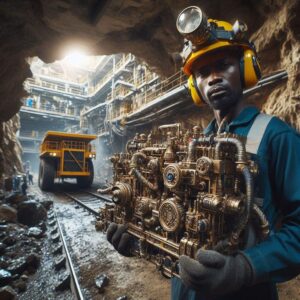A Technological Revolution Ignites the Continent's Resources Industry

Africa's vast reserves of minerals and metals have long been a sleeping giant, but a wave of transformative technologies is awakening the continent's mining sector, ushering in a new era of "Industry 4.0," according to industry heavyweights Rebecca Campbell and Gary Felthun.
"Imagine a mine where workers are no longer at risk of rock falls or tremors," Campbell enthuses. "Advanced automation and robotics are making this a reality, with benefits that go far beyond just safety."
A Technological Springboard
The mining industry in Africa has traditionally been labour-intensive, but new technologies are changing the game. "The adoption of these new technologies is like a springboard for African miners," says Felthun. "It allows them to not only compete on a global scale but also become leaders in efficiency, safety, and environmental responsibility."
One example is the Kamoa-Kakula Copper Project in the Democratic Republic of Congo. This mine, designed to produce the world's "greenest copper," utilizes automated mobile mining equipment, a stepping stone towards fully autonomous operations. "This is just the beginning," says Felthun. "We're going to see a future where African mines are at the forefront of technological advancements."
Challenges and the Road Ahead
Of course, this transition is not without its hurdles. Concerns remain around job displacement as automation takes hold. "We need to acknowledge this is a valid concern," says Campbell. "However, the industry is not going to disappear. New, highly skilled positions will be created."
The article emphasizes the importance of collaboration between mining companies, governments, and labour unions to ensure a smooth transition and equip workers with the skills needed to thrive in the new technological landscape.
Sustainable Future
Beyond efficiency and safety gains, these advancements offer a glimmer of hope for a more sustainable future. "New technologies allow miners to improve their environmental footprint," says Campbell. "This includes lower carbon emissions, less water usage, and minimized waste production."
Investors are increasingly scrutinizing the environmental impact of mining operations, and African miners who embrace sustainable practices will be best positioned to attract funding. "The mines of the future will be sustainable mines," says Felthun. "And African miners are well on their way to leading the charge."
A Continent Rising
The Sunday Times paints a picture of an African mining sector poised for a meteoric rise. With innovation at its core, Africa is primed to become a global leader in mining technology, creating a brighter future not just for the industry but for the entire continent.
"The sun is rising on a new era for African mining," concludes Campbell. "An era defined by progress, responsibility, and shared prosperity."
Building a Thriving African Mining Tech Ecosystem
The flourishing African Mining Technology sector is not merely about adopting existing technologies. Innovation hubs are taking root across the continent, fostering the development of homegrown solutions. "Africa has a rich pool of young talent," says Dr Ayesha Sokoto, a leading figure in the emerging African mining tech space. "We need to create an environment where these innovators can thrive."
Sokoto highlights the importance of investment in research & development and initiatives that bridge the gap between academia and industry. "Collaboration is key," she says. "By working together, we can ensure that African solutions are addressing African challenges."
Beyond the Mine: A Ripple Effect
The impact of a technologically advanced mining sector extends far beyond the mine pit. "A thriving mining tech industry can create a ripple effect throughout the economy," says Felthun. "New opportunities will be created in data analytics, manufacturing, and infrastructure development."
The development of a robust African mining tech ecosystem has the potential to unlock economic diversification and empower local communities. "This is about more than just minerals," says Campbell. "It's about building a brighter future for all Africans."
